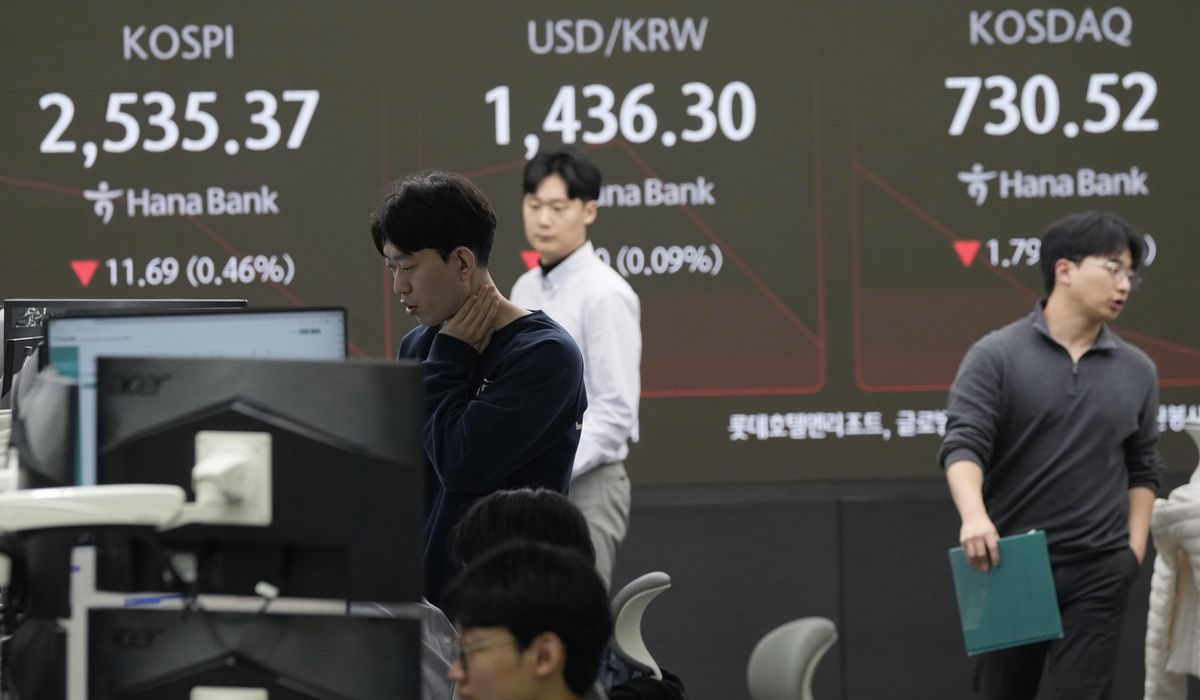


SEOUL, South Korea — The markets and currencies of U.S. Asia allies Japan and South Korea plunged Monday as their capital markets opened for the first time since President Donald Trump announced plans to hammer Mexico and Canada with tariffs.
While the leadership in Seoul and Tokyo kept their heads below the parapets, markets spoke loudly: Japan’s Nikkei Stock Average was down 2.66% at the close of business Monday, while South Korea’s leading Korea Composite Stock Price Index (KOSPI) was down 2.52%. Automakers in both nations were hard hit, as they have major investments in the two economies neighboring the United States.
European markets in France, Germany and Britain were also trading lower, though by less than their Asian counterparts.
U.S. markets appeared in line for a similar battering, with both the Dow Jones Index and the broader S&P 500 falling sharply in early trading Monday on Wall Street.
On Saturday, Mr. Trump had signed an order imposing 25% tariffs on goods imported from Canada and Mexico, while adding an additional 10% on imports from China — the three biggest trading partners for the U.S.
Tariffs are, essentially, taxes placed upon imported products. In the short term, they expand the coffers of the imposing government. Tariffs may also encourage overseas firms to establish manufacturing outposts to bypass tariffs, and can compel domestic consumers to buy local, rather than imported, goods.
SEE ALSO: Stock markets tumble as Wall Street unpacks Trump’s tariffs
However, they generally make products more expensive for domestic businesses and consumers across the board. They are criticized by free-market advocates for distorting competition and generating inefficiencies. More generally, they suppress trade and create bilateral tensions.
Many fear that the U.S. tariffs are the opening salvo in a trade war. Canada has responded with tariffs of its own upon U.S. products, and Mexico has vowed to do so.
The next target of Mr. Trump’s tariff barrage looks likely to be the European Union, which also runs a substantial annual trade surplus with the U.S.
Speaking to a press gaggle this weekend, he said the EU bloc was “really out of line,” adding, “I wouldn’t say there’s a timeline [for tariffs on the EU] but it’s going to be pretty soon.”
Though no tariffs have yet been declared upon Tokyo or Seoul, there is widespread fear within the export-dependent East Asian manufacturing powerhouses that they, too, will find themselves in Mr. Trump’s crosshairs.
America’s long-term trade imbalances with Japan and South Korea are glaring.
U.S. Census Bureau data finds that both Japan and South Korea have enjoyed significant trade surpluses with the United States every year for the past decade through 2023, a trend likely to continue for 2024. Japan had a $62.5 billion surplus last year, down slightly from $71.4 billion in 2023, while South Korea’s surplus $60.2 billion for the year 2024, up from $51 billion in 2023.
As the new administration in Washington enacts a raft of new policies, U.S. allies find themselves in sensitive negotiating positions as they review their relationships — not just economic, but also strategic.
While neither Canada nor Mexico face immediate threats, that is not the case elsewhere, where U.S. forces and arms are vital to national security. But Washington’s European and Asian allies face pressure on a separate front from trade from the new U.S. administration.
In his first term in office, Mr. Trump angrily demanded that U.S. allies raise their respective defending spending, and also demanded more remuneration for hosting U.S. troops. According to the latest Department of Defense data, from June 2024, the top five national hosts of overseas GIs were Japan (52,852), Germany (34,894), South Korea (23,732), Italy (12,319), and the U.K. (10,180).
• Andrew Salmon can be reached at asalmon@washingtontimes.com.
